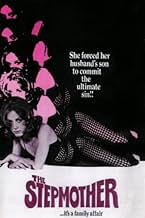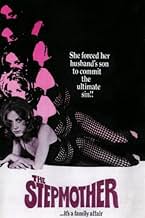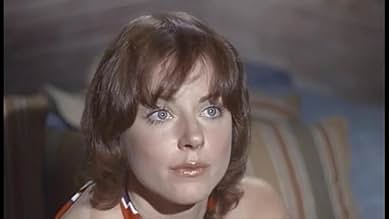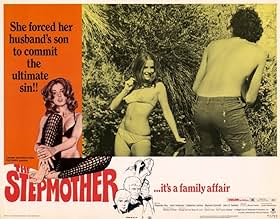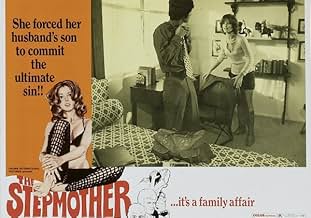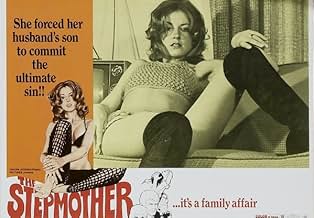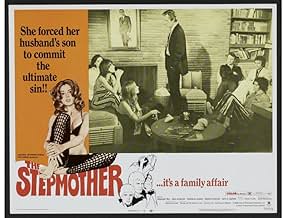As part of a blackmail plot, a woman is forced to seduce her new husband's son. Complications, including murder, ensue.As part of a blackmail plot, a woman is forced to seduce her new husband's son. Complications, including murder, ensue.As part of a blackmail plot, a woman is forced to seduce her new husband's son. Complications, including murder, ensue.
- Nominated for 1 Oscar
- 1 nomination total
Katherine Justice
- Margo Delgado
- (as Catherine Justice)
Margaret Garcia
- Lupé
- (as Margarite Garcia)
Gil Barreto
- José
- (as Gilberto Berreto)
Bert Madrid
- Mexican Businessman
- (as Burt Madrid)
David Garfield
- Goof
- (as John D. Garfield)
- Director
- Writer
- All cast & crew
- Production, box office & more at IMDbPro
4.1560
1
2
3
4
5
6
7
8
9
10
Featured reviews
Hideous flaws, solid performances
I profoundly enjoyed this film. There are some glaring errors in cinematography and blocking and editing, and there is often a feeling of ineptness. The plot itself is pure melodrama and violence.
The strength of the performances is what intrigues me. When you have a one shot of an actor delivering several lines, it's almost always done with gusto. These actors are throwing themselves into these pitiful roles. They are doing solid hard work here.
just know that all of the criticisms are correct. The film really seems as if it was made with no professional input. But the actors are phenomenal.
The strength of the performances is what intrigues me. When you have a one shot of an actor delivering several lines, it's almost always done with gusto. These actors are throwing themselves into these pitiful roles. They are doing solid hard work here.
just know that all of the criticisms are correct. The film really seems as if it was made with no professional input. But the actors are phenomenal.
Weird even by weird 70's standards
I like weird 70's movies a lot, but this is weird even by weird 70's standards. It takes about half the movie, for instance, to even figure out why it's CALLED "The Stepmother"--it, at first, seems to be a movie about a jealous middle-aged, Mexican-American architect who murders a business associate after he finds him in bed with his younger gringa wife (and unbeknownst to the wife). By a weird coincidence another more lower-class Mexican also murders his wife in the same area and is framed for both murders. But the cops begins to suspect the architect, and his continuing jealously causes him to accidentally kill his partner and best friend (played by "MASH's" Larry Linville). He then has to fend off the amorous advances of the friend's widow before the cops grow even more suspicious. Got all that so far?
So why is it called "The Stepmother"? Well, about halfway through the man's son shows up from Mexico City, and he also starts messing around with the young wife (his stepmother)and the off-kilter plot REALLY goes into over-drive.
There are a few reasons to see this. First, if you're a weird 70's film completist. This film is kind similar to early 70's bizarro flick "Swinger's Massacre", which was equally ridiculous but had a less random plot. Second, if you're a fan of Larry Linville, he's actually pretty good here and acts circles around the rest of the unknown cast. The best reason perhaps though is this was the first appearance of cult drive-in queen Claudia Jennings. Jennings has a cameo role as a stoned-out hippie chick who has one hilarious line where she tell the cops she was "way too ripped" to remember what happened the night of the murder. (And if that isn't worth the price of admission, she also has her typically gratuitous full-frontal nude scene). Weird, weird movie, but if any of this sounds interesting to you, check it out.
So why is it called "The Stepmother"? Well, about halfway through the man's son shows up from Mexico City, and he also starts messing around with the young wife (his stepmother)and the off-kilter plot REALLY goes into over-drive.
There are a few reasons to see this. First, if you're a weird 70's film completist. This film is kind similar to early 70's bizarro flick "Swinger's Massacre", which was equally ridiculous but had a less random plot. Second, if you're a fan of Larry Linville, he's actually pretty good here and acts circles around the rest of the unknown cast. The best reason perhaps though is this was the first appearance of cult drive-in queen Claudia Jennings. Jennings has a cameo role as a stoned-out hippie chick who has one hilarious line where she tell the cops she was "way too ripped" to remember what happened the night of the murder. (And if that isn't worth the price of admission, she also has her typically gratuitous full-frontal nude scene). Weird, weird movie, but if any of this sounds interesting to you, check it out.
Taboo (4.4)
Ban, a sacred prohibition by which certain people or objects are considered untouchable, certain actions unperformable, certain words unspeakable. The sinful relationship between the stepmother and her stepson is the film's breaking point, revealing the dark side of desire and sexual repression. The marriage founders because of this betrayal and the lies used to hide it. The violence stems from domestic evil, not from external enemies, but from within the home. The protagonist is violent and kills in the grip of jealousy, unleashing a spiral of guilt, cover-ups, and lies. He doesn't even seek redemption, driven only by insane jealousy. The female figure is not only a seductress, but also an element of fragility, using sensuality as a mask for her existential unease.
Real estate developer Frank Delgado (Alejandro Rey), returning home from a business trip, finds a friend at home who confesses to having sex with his wife, Margo (Katherine Justice). Enraged by jealousy, Frank kills him. From that night onward, his partner Dick Hill (Larry Linville) begins to suspect something is afoot, but in an accident, he falls from a building during an argument with Frank and dies. Dick's wife, Sonya Hill (Marlene Schmidt), becomes his new partner, raising Inspector Darnezi's (John Anderson) suspicions of an affair between her and Frank.
Director Howard Avedis (4.0) attempts to craft a Hitchcockian thriller, but his success is limited, partly due to the modest means available; the screenplay (5.0) by the director himself alternates between a slow pace and sudden accelerations, with some "disjointed" or redundant sequences and an excessive use of freeze-frame; from a technical standpoint (5.0), Robert Steadman's cinematography stands out, despite its technical limitations, it manages to create a sufficiently realistic atmosphere; Audrey Granville's soundtrack is melodramatic, contrasting too much with the delicate song "Strange Are the Ways of Love" by Sammy Fain and Paul Francis Webster (nominated); the cast (4.0) is very disappointing, out of character, stiff, and unbelievable, with the only exceptions being the two female leads, Justice and Schmidt.
Best moment: Probably the beginning, where the film presents itself for what it is: poor acting, a morbid plot, technically modest, but with a beautiful song that proves that even in a pigsty, a beautiful flower can grow. Worth watching when you have nothing better to do, or you want to fall asleep listening to a voice that keeps you company.
Real estate developer Frank Delgado (Alejandro Rey), returning home from a business trip, finds a friend at home who confesses to having sex with his wife, Margo (Katherine Justice). Enraged by jealousy, Frank kills him. From that night onward, his partner Dick Hill (Larry Linville) begins to suspect something is afoot, but in an accident, he falls from a building during an argument with Frank and dies. Dick's wife, Sonya Hill (Marlene Schmidt), becomes his new partner, raising Inspector Darnezi's (John Anderson) suspicions of an affair between her and Frank.
Director Howard Avedis (4.0) attempts to craft a Hitchcockian thriller, but his success is limited, partly due to the modest means available; the screenplay (5.0) by the director himself alternates between a slow pace and sudden accelerations, with some "disjointed" or redundant sequences and an excessive use of freeze-frame; from a technical standpoint (5.0), Robert Steadman's cinematography stands out, despite its technical limitations, it manages to create a sufficiently realistic atmosphere; Audrey Granville's soundtrack is melodramatic, contrasting too much with the delicate song "Strange Are the Ways of Love" by Sammy Fain and Paul Francis Webster (nominated); the cast (4.0) is very disappointing, out of character, stiff, and unbelievable, with the only exceptions being the two female leads, Justice and Schmidt.
Best moment: Probably the beginning, where the film presents itself for what it is: poor acting, a morbid plot, technically modest, but with a beautiful song that proves that even in a pigsty, a beautiful flower can grow. Worth watching when you have nothing better to do, or you want to fall asleep listening to a voice that keeps you company.
the worst looking Oscar nominated movie
Architect Frank Delgado returns to his home in Mexico. His wealthy client Alan Richmond forces himself on his wife Margo. Frank runs into Alan on his driveway. Suspecting them having an affair, Frank kills Alan and buries his body. He escapes without being seen by a fighting couple. The police investigates Alan's strangulation death but also the young Mexican woman. Dick Hill arrives with company to talk his business partner Frank into going to a beach house which belongs to Alan.
This movie starts off well with a murder. However the tension that is build up by the opening is lost as the movie struggles through a slow boring slough. This is possibly the worst looking movie I've ever seen that is nominated for an Oscar. Alejandro Rey is a pretty awful actor. The movie has a few good actors and Larry Linville could have been an interesting lead. The staging is very static and the bad direction drains away all of the tension.
This movie starts off well with a murder. However the tension that is build up by the opening is lost as the movie struggles through a slow boring slough. This is possibly the worst looking movie I've ever seen that is nominated for an Oscar. Alejandro Rey is a pretty awful actor. The movie has a few good actors and Larry Linville could have been an interesting lead. The staging is very static and the bad direction drains away all of the tension.
Seemed to Lag Here and There
Upon returning home from a business trip "Frank Delgado" (Alejandro Rey) finds another car in his driveway and happens to see his wife, "Margo Delgado" (Catherine Justice) in their bedroom with another man. As the man comes out into the front yard Frank kills him in a fit of rage. Immediately afterward he comes to his senses and decides to quickly bury him in a field on the outskirts of town. Unfortunately, as luck would have it the body is soon discovered anyway and Frank is considered as a possible suspect. In the meantime though, Frank cannot manage to forgive his wife because of her supposed infidelity and so refrains from making love to her from then on. What he doesn't know is that the man he killed had forced himself on her and since Margo is unaware that Frank knows anything about this incident it has left her feeling confused and sexually frustrated. Now, rather than reveal any more of the film I will just say that this was an adequate movie for the most part. The acting was okay but the story seemed to lag here and there. Likewise, I also thought the ending was a bit too abrupt. All things considered then, I rate the movie as slightly below average.
Did you know
- TriviaThe Oscar nomination for "Strange Are The Ways Of Love" for Best Song marked the only time a Crown International Picture title got an Oscar nomination. It lost to "The Morning After" from The Poseidon Adventure (1972).
- Quotes
Sonya Hill: My life's empty without Dick.
- ConnectionsFeatured in Dusk to Dawn Drive-in Trash-o-Rama Show Vol. 8 (2002)
- SoundtracksStrange Are The Ways Of Love
(theme song)
Music by Sammy Fain
Lyrics by Paul Francis Webster
Arranged by Robert Matthews
Vocal by Manuel
- How long is The Stepmother?Powered by Alexa
Details
- Release date
- Country of origin
- Official site
- Language
- Also known as
- Impulsion
- Filming locations
- Los Angeles, California, USA(Filiming City)
- Production company
- See more company credits at IMDbPro
Contribute to this page
Suggest an edit or add missing content


